Sedation Dentist – Mineola, NY
Experience Dental Care Without the Anxiety
Is going to the dentist always stressful for you no matter what kind of treatment you need? Has this anxiety caused you to cancel appointments or miss out on much-needed care for years? We completely understand, and we’re ready to help you finally relax with our sedation options. From routine cleanings to advanced restorative care, we can use sedation dentistry in our Mineola dental office to make any appointment fly by, so that at the end, your only thought is, “That’s it?” Call us today to find out which option might be right for you.
Why Choose Meadowbrook Dental Care for Sedation Dentistry?
- Gentle & Effective Nitrous Oxide
- Fast-Acting IV Sedation
- Kind & Patient Team
IV Sedation
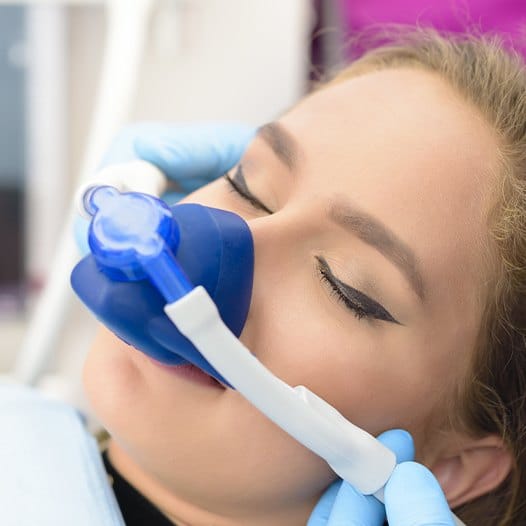
Compared to other patients, you may have severe dental anxiety. Perhaps your fears are intense and greatly disrupt oral treatments. If so, our office can provide a helpful solution: IV sedation. It uses our most powerful sedative to help you relax deeply and calm your frayed nerves. Plus, the option has other perks that make it a convenient service. To learn more, just keep reading or contact our office for details.
What Is IV Sedation?
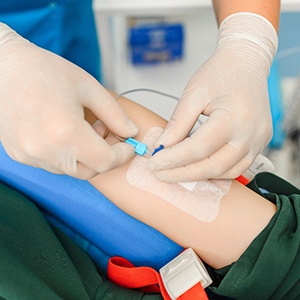
Put simply, IV sedation is the most potent sedation dentistry available. It intravenously administers a sedative into your bloodstream. As a result, its effects tend to “kick in” rather quickly.
Compared to nitrous oxide, IV sedation promotes a far deeper relaxation. (This effect stems from its use of either Midazolam or Diazepam.) Still, it normally won’t put you to sleep; you should stay conscious throughout the procedure. That said, you likely won’t remember the treatment and may feel as if you were unconscious. (Some patients thus call this service “twilight sedation.”)
Of course, you can rest assured that IV sedation is safe. Our dental team members will monitor your vitals while you’re sedated. (That way, we can ensure you remain stable.) Also, the sedative won’t leave any harmful side effects. You’ll just feel slightly dizzy for a day, so have a friend or family member pick you up from the appointment.
Who Is a Good Candidate for IV Sedation?
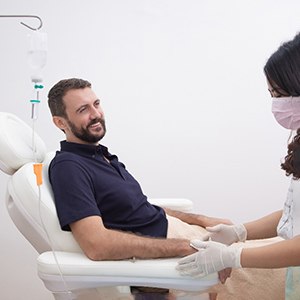
Due to its potency, IV sedation is best reserved for patients with severe phobias or a need for extended care. However, there are other factors you could consider.
For example, one such element is patient sensitivity. You could greatly benefit from IV work if you have an overactive gag reflex. While sedated, your throat muscles would relax enough for the dentist to proceed with care.
Alternatively, those not easily numbed may find IV sedation helpful. The latter can prove effective for a patient who needs pain relief but isn’t affected by typical anesthetics.
Still, you should get a dental consultation to confirm your candidacy. Doing so allows our dentists to review your medical history. Once they have, they’ll ensure you aren’t allergic to the medication and that IV sedation is safe for you.
The Benefits of IV Sedation
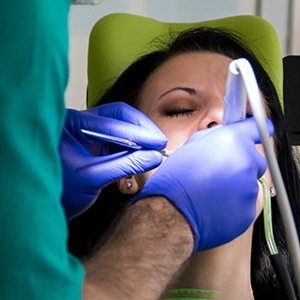
Compared to nitrous oxide, IV sedation dentistry has many unique perks. These include the following:
- Deep Relaxation – The calm produced by IV sedation is fairly intense. In fact, it’s so deep that it prevents patients from developing more traumatizing dental memories.
- Fast Action – Since IV sedation is administered directly into the bloodstream, it quickly takes effect.
- Controlled Flow – A dentist and their team can control IV sedation’s medication flow. For that reason, the sedative level can be adjusted throughout treatment.
- Improved Oral Health – By treating overwhelming fear or anxiety, IV sedation can improve the oral health of those who’d otherwise skip dental visits.
Nitrous Oxide Sedation
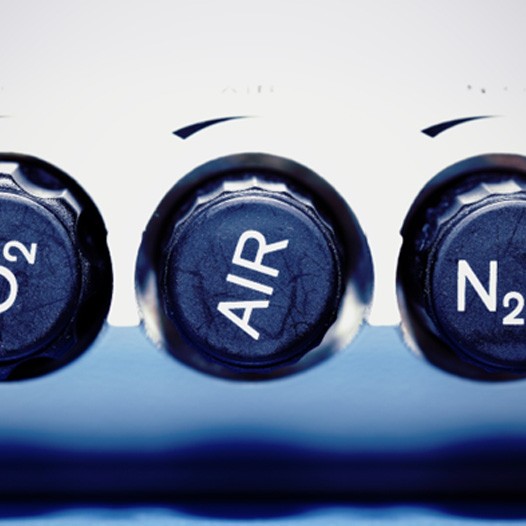
Some patients don’t need as much help dealing with their dental anxieties and only require a mild type of sedation to stay calm during their dental appointments. In these cases, we’ll likely suggest a type of dental sedation that you may have heard of - nitrous oxide. The effects of the nitrous oxide kick in quickly, and you won’t have to wait too long for them to wear off after your procedure. This means you can enjoy the benefits of sedation dentistry without worrying about how it will affect your schedule for the rest of the day.
Who Is a Good Candidate for Nitrous Oxide?

Nitrous oxide can be a good choice if:
- You are anxious about visiting the dentist.
- You tend to be uncomfortable with needles.
- You often have trouble getting dental work done due to a strong gag reflex.
- You are unable to fully control your movements, meaning you often can’t sit still.
On the other hand, you might not be an ideal candidate for nitrous oxide if:
- You are pregnant.
- You have congested sinuses.
- You have a respiratory disease of some kind.
- You are currently taking certain medications.
To know for sure if nitrous oxide is a good fit for you, we will need to take a look at your medical history and consider your current needs. Please let us know if you have any concerns about nitrous oxide; we won’t move forward with the treatment until you feel like you’re properly informed about what to expect.
How Does Nitrous Oxide Work?
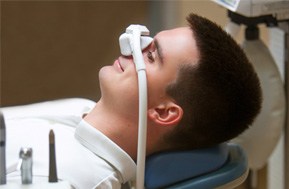
Typically, the only preparation you’ll need to make for nitrous oxide sedation is to avoid eating anything too heavy before your appointment. Otherwise, all you need to do is come to our office and make yourself comfortable in our treatment chair. Our team will fit a small mask over your nose before turning on the machine that releases nitrous oxide mixed with oxygen.
Nitrous oxide can make you feel very relaxed and happy. It does not, however, put you to sleep. As such, we can still ask questions or give you instructions if we need to. Our team may increase or decrease the level of sedation depending on your needs during your treatment.
Aftercare for Nitrous Oxide
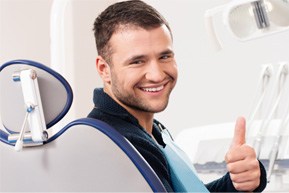
Naturally, any aftercare instructions you receive after your dental appointment will depend on what kind of treatment was performed. With that said, there generally isn’t anything you need to do to recover after nitrous oxide sedation. The effects will wear off within minutes, so it will typically be safe for you to drive on your own afterward. You’ll also be able to return to work, run any necessary errands, and generally carry on with the rest of your day as normal.
Sedation Dentistry FAQs
What are the side-effects of sedation dentistry?
While side-effects due to sedation are relatively rare, some of the most common ones that people experience include:
- Drowsiness
- Dizziness
- Confusion
- Shivering
- Dry mouth
- Nausea
These are all short-term and will dissipate as the sedation leaves your system. However, if you begin to experience other effects or become concerned about your reaction to the sedation, don’t hesitate to call our office or visit the emergency room to be safe.
Does dental sedation put you to sleep?
Dental sedation can definitely cause you to fall asleep as a result of feeling so relaxed, but it doesn’t actually put you to sleep. In many cases, especially with IV sedation, patients fall asleep while they’re in the treatment chair, but they remain conscious throughout their entire appointment. This means that if our team needs to wake you up for any reason, you’ll be able to return to an alert state and respond to us.
Can dental sedation make you sick?
While it’s rare that dental sedation makes you sick, one side-effect of sedation dentistry can be nausea and dizziness. IV sedation has a more elevated risk of this because it has a stronger effect on the body, but it’s relatively rare to experience with nitrous oxide sedation.
Is sedation dentistry covered by insurance?
Our team at Meadowbrook Dental Care is proud to accept virtually all PPO dental insurance plans and maximize your benefits at every turn. We’ll conduct a benefits check with your dental insurance company before your appointment to provide you with an estimate of how much they will cover of your dental sedation. In some cases, insurance providers may not allow any benefits towards this service, in which case the cost will be out-of-pocket. If you have any questions or concerns about this, please give us a call!
What does dental sedation feel like?
Whether you opt for nitrous oxide or IV sedation, both will make you feel incredibly relaxed and at-ease while you’re in the treatment chair. You’ll remain completely conscious, but in a state of euphoria. Some patients report that they feel tingling sensations in their arms and legs, while others experience a “heavy” feeling of relaxation that makes them fall asleep during their appointment. IV sedation can also cause short-term memory loss, which can be beneficial for patients who have severe fear or anxiety surrounding visiting the dentist.
